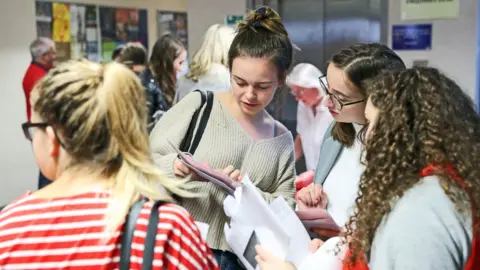A-level and GCSE results: 'Improved' schools can challenge grades
 BBC
BBCSchools in England can appeal if they can show this year's GCSE and A-level results do not reflect recent improvements, the exams watchdog says.
Ofqual's announcement comes amid concern that the manner in which grades are calculated in the absence of exams could penalise some pupils.
In Scotland there were claims that a similar system marked down poorer pupils more heavily.
Individual pupils will not be able to challenge their grades, however.
With exams cancelled due to the coronavirus pandemic, A-level results on 13 August and GCSE results a week later are being calculated by combining teachers' estimated grades for individual pupils with a statistical model based on the school's past results.
Basically, it means that if the evidence suggests a school has been a little too generous in how it thinks pupils would have performed, the school's results will be adjusted downwards.
Some head teachers had criticised the "narrow" right of appeal that was initially in place: it stated that schools could only challenge the results if there had been a technical error in calculating a particular grade.

This week saw Scotland's exam results' day overtaken by disappointment and anger that so many disadvantaged students appear to have had their teachers' estimates downgraded.
Ahead of A-levels results' day in England next week, the exams regulator has made, what many might consider, a strategic shift.
It's still no easier for a student to appeal - they can only do that on technical grounds of process, or if they have clear evidence of discrimination.
But, in theory at least, the shift makes it easier for a school to challenge results if they think the school's past history of poor exam grades is being unfairly applied.
That doesn't mean that many will succeed - the exams regulator in England has made it clear it thinks these cases will be rare.
In the short term, at least, it may take just some of the political sting out of results' day if it turns out as many students in England as in Scotland have had their teachers' estimates downgraded.
 PA Media
PA MediaLabour's shadow education secretary, Kate Green, said that system risked "baking in inequality" if results are based on a "computer algorithm" rather than "merit".
When Scottish pupils received their results on Tuesday, there were warnings of a "deluge" of appeals after 125,000 grades were lowered - a quarter of the total - while only about 9,000 were adjusted upwards.
Since then, Ofqual has said schools and colleges in England can challenge the results basing their arguments on a number of other grounds, including if the school has been through a major change of leadership which has turned around recent performances in the classroom.
Schools which can show evidence they were expecting different results because they have an exceptional group of students this year can also contest the grades.
Other grounds for appeal might be that past results were distorted by a "monumental event", such as a flood or fire, or the school has changed from a single-sex school to a mixed one.
'Exceptional circumstances'
But the exam regulator said it expects challenges to the way it calculates grades to be rare.
Education Secretary Gavin Williamson said: "It is vital that students with exceptional circumstances are not held back by the way grades have been calculated."
Although students cannot appeal directly to the exam boards over their calculated grades, they can submit allegations about bias or discrimination in the way their teachers estimated their grade.
In addition, students who are unhappy with the grades awarded also have the option of sitting A-level exams in October, or GCSE exams in November.
Ofqual has previously said it expects results to be higher this year than in previous summers, although lower than the "optimistic" predictions of teachers.
It also said it is confident that the results will show there was no "unconscious bias" in the predicted grades from teachers which might disadvantage ethnic minorities or poorer students.
